With White Tablecloths and a Storied History, Headliners Club Seeks to Maintain Relevance in Changing Austin
By Andrew Logan
Reporting Texas
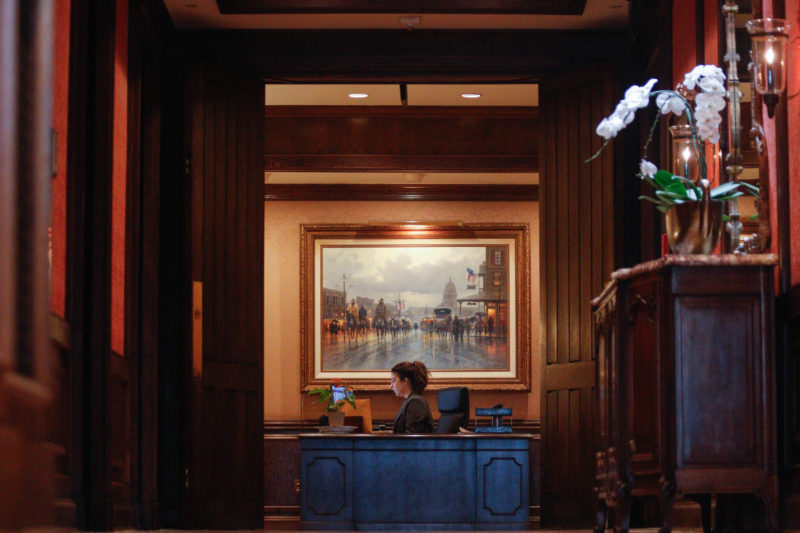
Administrative assistant Christa Chimento sits at the Headliners Club receptionist desk in Austin, Texas, on April 8, 2022. The club was founded in 1954 as a place for journalists and their sources to meet. Blaine Young/Reporting Texas
On the 21st floor of the Chase Tower in downtown Austin, Brian Greig was eating lunch at the Headliners Club on a Tuesday afternoon in March. Greig, chairman of the board of directors of the club, sat at a table draped with an elegant pressed white tablecloth.
The 72-year-old retired lawyer peered out at a stunning view of the Austin skyline. He pointed to a building under construction a couple of blocks away.
“Facebook has leased that entire building,” he said in between bites of beef tenderloin.
Upon completion, the structure at Sixth and Guadalupe will be 66 stories and become Austin’s tallest skyscraper.
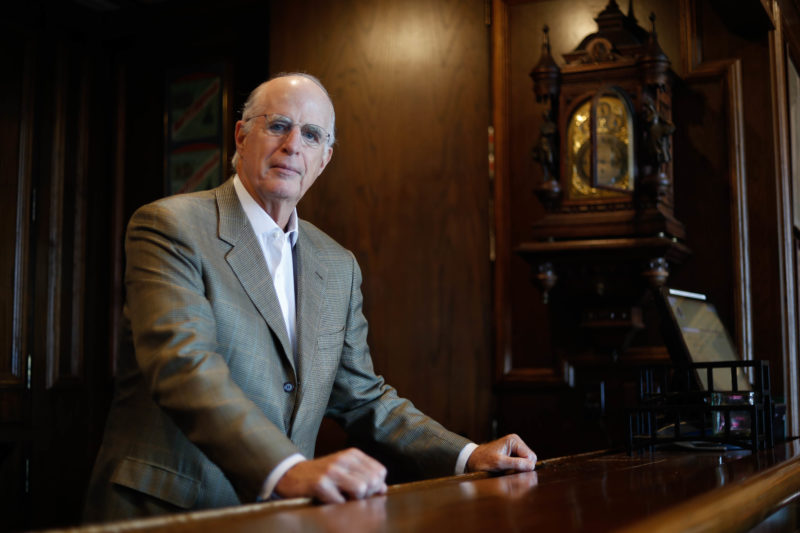
Brian Greig, chairman of the board of directors for the Headliners Club, sits in a room called the “Press Box” on April 8, 2022. Blaine Young/Reporting Texas
“That’s going to be a lot of people,” Greig said. “Most of those aren’t going to be members of the Headliners Club, but there may be some people in management, there may be some people in government relations, maybe some people in those companies would be interested in a club like this.”
Founded in 1954, the Headliners Club has remained a powerful institution in Austin for almost 70 years despite the many changes in the city’s demographics, and its leadership is confident it can sustain that relevance as Austin experiences rapid growth led by the tech industry.
Members include the state’s most prominent leaders in government, business, higher education and journalism. While critics say such organizations can reinforce class privilege and in practice often exclude people of color, the Headliners Club has maintained its reputation as an exclusive stronghold of the elite in Texas’ politically progressive state capital.
“I think it’s important not to try to be all things to all people,” Greig said. “We try to be, in a way, sort of as open as Austin is. Austin’s a pretty open place. We try not to be stodgy, but by the same token, it probably is more a club of mature, accomplished people.”
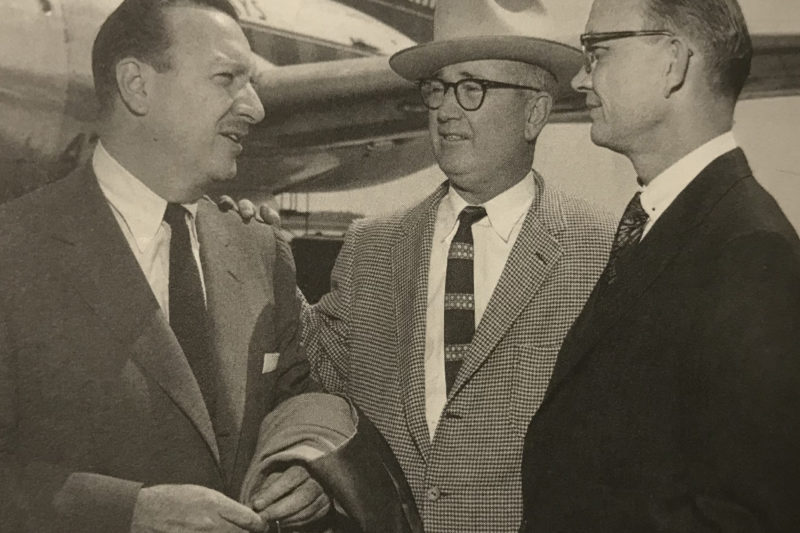
Headliners Club founder Charles Green, right, meets with Walter Cronkite, left, and Amarillo Globe-News publisher S.B. Whittenberg, after Whittenberg was awarded the first publisher of the year honor. Photo courtesy of the Headliners Club
The Headliners Club was the brainchild of Austin American-Statesman executive editor Charles E. Green, who conceived of the club as a comfortable place for his reporters to cultivate and interact with sources.
The motto of the Headliners Club is, “Not who, but what.”
“What that means is it’s not what your birthright was, what your family was. It’s what you’ve made of yourself, what you’ve accomplished,” Greig said.
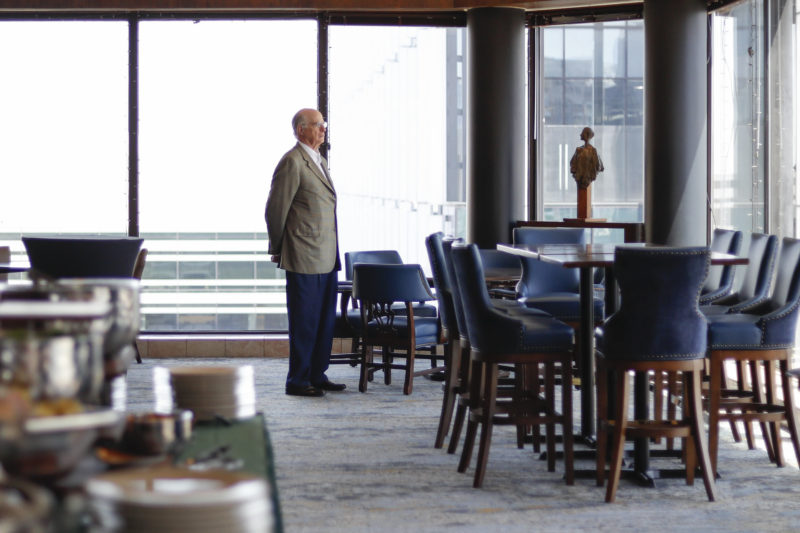
Brian Greig looks out the windows of the Headliners Club that sits on the 21st floor of the Chase building in Austin, Texas. The club has had notable members such as former U.S. presidents, Texas governors and renowned journalists. Blaine Young/Reporting Texas
Notable members of the Headliners Club, past and present, include former U.S. Presidents Lyndon Johnson and George W. Bush, former Texas Govs. Rick Perry and Ann Richards, U.S. Rep. Barbara Jordan, renowned journalists Dan Rather and Lawrence Wright and physicist and Nobel laureate Steven Weinberg.
The Headliners Club began as an all-male club. In 1975, Lorene Rogers became the first female member when she was elected president of the University of Texas at Austin. The club offers a membership to whoever holds that office.
Liz Carpenter, Lady Bird Johnson’s press secretary, and Sarah Weddington, the attorney who represented “Jane Roe” in the landmark Supreme Court case Roe v. Wade, became members in 1977.
The first Black member was Berl Handcox, Austin’s first Black city council member. The exact date of when he became a member is unknown, but it was sometime before 1981, said Sue Meller, managing director of the Headliners Club from 1981-2021.
“The club has never had a restriction on membership based on race,” Greig said.
But membership is by invitation only. A person must be sponsored by two members in good standing in order to become a member. The prospective member then submits a written application and must receive at least a two-thirds favorable vote from the membership committee. The board of trustees approves membership with a final majority vote.
Greig declined to provide the Headliners Club’s membership numbers and dues. He noted fees are comparable to other private clubs in the city and lower than dues at country clubs.
“We do look for new members, but our membership has been very steady over the years – the level of membership – essentially replacing the people that have left the club for one reason or another,” Greig said. “And we welcome younger members. We have a legacy member program, where the son or grandson or daughter and granddaughter of a club member can join the club at a reduced initiation fee.”
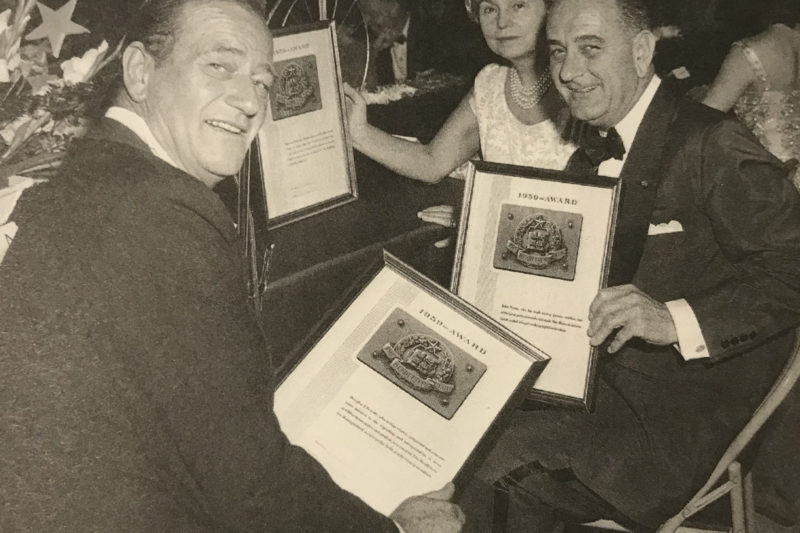
Politicians and other news makers could be found at the club, as in this photo where John Wayne, from left, Houston Post publisher Oveta Culp Hobby, and then Senate Majority Leader Lyndon Johnson sit together after being honored in 1960. Photo courtesy of the Headliners Club
The club prides itself on being an environment where people from differing political ideologies can interact in a non-confrontational atmosphere.
“It’s one of the few places where I can go and run into Karl Rove or a (U.S. Sen.) John Cornyn, and, you know, it’s not enemies across the battlefield,” said Rusty Todd, UT professor emeritus in journalism. “It’s a place where people of all kinds of political stripes can sit down and have a conversation.”
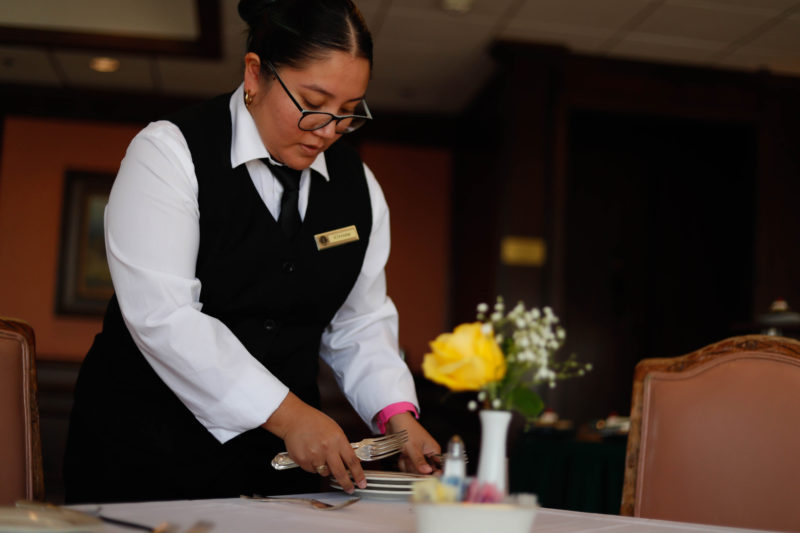
Banquet server Cristy Lopez Santana sets a table at the club which offers a restaurant and hosts private events for members. Blaine Young/Reporting Texas
In addition to operating a restaurant for members and their guests, the Headliners Club hosts private events ranging from proms to political fundraisers.
Diana Kendall, a sociology professor at Baylor University and a member of the Headliners Club from 1980-2008, wrote the book “Members Only: Elite Clubs and the Process of Exclusion,” published in 2008. People of color have historically not had connections with members of private clubs that allow individuals to benefit from networking with community power brokers, Kendall told Reporting Texas.
The membership fee is “a significant sum of money,” she added. “Well, some people, that doesn’t fit into their budget, you know, especially young minority professionals. They’ve been trying to start a family and trying to buy a house in Austin, so this would become a burden that they would not spend money on.”
“Obviously, you know, we’re in a part of the country where there’s a racist past, where they just simply did not bring in people of color, etc., to organizations. And that was obviously overt. It was intentional,” Kendall said. “But sometimes those rules or policies or traditions don’t really exist anymore. People don’t really talk about them anymore, but they still have a lasting impact on people who don’t come up through the same thing.”
Greig dismissed such criticism, saying it has no relevance to the Headliners Club.
“We have people of color in the club, on the board and in leadership,” Greig said. “Neither race, sex, religion, national origin nor sexual orientation are impediments to nor considered in deciding membership. I practiced law in the field of civil rights for 40 years and would not countenance wrongful discrimination.”
Newer social clubs in Austin, such as Soho House, which opened in 2021, and Pershing, which started in 2018, cater to a different clientele than the Headliners Club.
Dannye Donnell, business development director at Pershing, said the Headliners Club was “very nice” and had “something to offer.”
“There’s enough pie to go around,” Donnell said, as she prepared for a 124-person seated dinner for her members with guest celebrity chef Paul Qui. “We’re kind of focused on doing what we’re doing, cultivating a really special community bonded over shared interests such as food, the arts and shared community.”
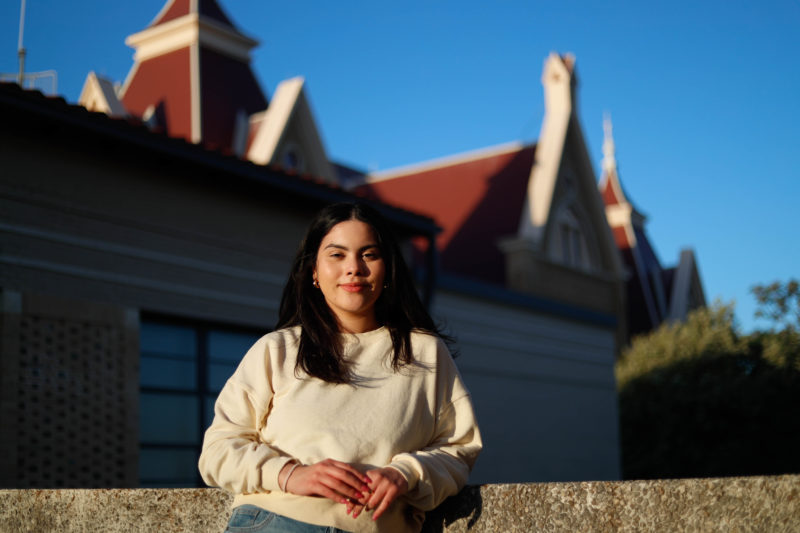
Headliners scholarship recipient Brianna Benitez, a pubic relations senior at Texas State University and the University Star’s editor in chief, is one of many who have benefitted from the club’s academic support. Blaine Young/Reporting Texas
“I think a lot of the members think that the encouragement, providing resources, etc., to younger people who are going to shape the future of Austin … that’s something that they’re very interested in,” said Patti Ohlendorf, former vice president of legal affairs for UT-Austin and current executive director of the Headliners Foundation. “I think that’s one of the reasons that a number of the members of the Headliners Club contribute monthly, a small amount on their monthly payments, to the foundation.”
Baylor University student Drake Toll received scholarships from the Headliners Foundation for 2020-21 and 2021-22. A junior majoring in journalism, Toll plans to go into sports broadcasting. He works three part-time jobs in order to pay tuition and living expenses, he said.
“When I got word that I had received an outside scholarship for a $6,000 amount I was floored,” he said. “I remember really rushing to tell my parents and being so joyful in that moment knowing that I wasn’t going to have to worry about pulling student loans.”
The Headliners Foundation is raising money for a new scholarship honoring George McElroy, the first Black reporter hired at a prominent Texas newspaper, the Houston Post.
McElroy’s daughter, Kathleen McElroy, now leads UT journalism department. She’s a member of the Headliners Club and serves on the board of the Headliners Foundation.
“It is inspiring to see my father’s name among the roster of scholarships, especially since he himself could not donate to this,” McElroy said.